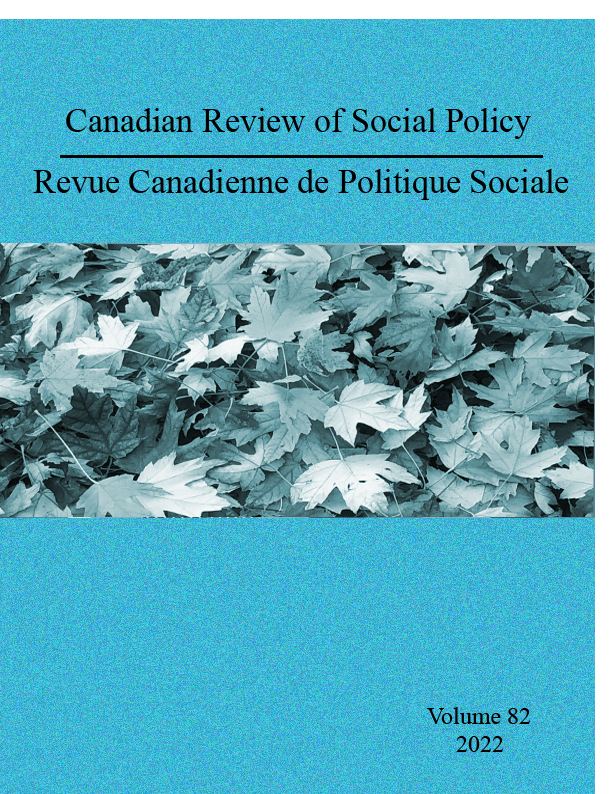Reimagining Policy Spaces: Toward Accessible and Inclusive Public Engagement
Mots-clés :
intersectionnalité féministe, espaces politiques, mobilisation du public, femmes sourdes, femmes handicapées, femmes de milieu ruralRésumé
Cette étude explore le potentiel des espaces politiques dans le but d’amener les groupes marginalisés de manière plus concertée au centre de la participation aux politiques publiques. En adoptant une approche intersectionnelle féministe pour examiner les limites des politiques publiques classiques et des modes conventionnels de mobilisation du public, nous proposons une définition plus fluide et fonctionnelle de l’espace politique qui englobe à la fois les aspects physiques et sociaux ainsi que leurs interrelations. Nous appliquons ensuite cette définition à notre recherche avec deux exercices de mobilisation du public tenus en Nouvelle-Écosse, soit un atelier et un groupe pour les femmes handicapées et sourdes, ainsi qu’un balado pour les femmes en milieu rural. Ces deux exercices faisaient partie d’un projet plus vaste visant à obtenir des commentaires politiques approfondis et nuancés de la part de plusieurs groupes historiquement marginalisés. Grâce à nos observations de ces exercices (y compris d’important succès et échecs), nous proposons une approche théorique des espaces politiques éclairée par les contributions et les intérêts des groupes en question, tout en considérant les dynamiques de pouvoir intersectionnelles, la positionnalité et le lieu.
Téléchargements
Publié-e
Comment citer
Numéro
Rubrique
Licence
1-The author guarantees that the manuscript is an original work not published elsewhere in print or electronically in whole or in part, except in abstract form, that the author has the full power to make this contribution, and that the manuscript contains no matter libelous or otherwise unlawful or which invades the right of privacy or which infringes any proprietary right.
2-The author guarantees that the manuscript has not been previously published in print or electronically and that if the manuscript contains any tables, figures or images fully reproduced or closely adapted from previously published material, the author must obtain the necessary permission from the author/publisher holding the original copyright prior to publication in CRSP. The author may be required to produce evidence of permission granted to CRSP’s editors.
3-As a condition of publication in CRSP, the author assigns all copyright to CRSP, including but not limited to the right to publish, republish, and otherwise distribute this manuscript in print, electronic, or other formats. As CRSP is a non-profit interdisciplinary scholarly journal, the author will receive no royalty or other monetary compensation for the assignment set forth in this agreement.
For the purpose of full disclosure, CRSP will not normally use the content provided by the author in a commercial venture, but for the purpose of disseminating the author’s content to as many readers as possible. For distribution, third parties engaging in commercial activities may be contracted to distribute the content globally, and such parties may make a profit out of the author’s content in their normal course of business. CRSP will not pay the author or reimburse the author in any form based on such commercial activities because the conduct of such commercial activities is outside the control of CRSP.
Any future reference to or use of this published material by the authors must acknowledge CRSP as the original place of publication.
PERMISSION REQUEST/ARCHIVING
Permission is given to author(s) receiving funding via Tri-Council Agencies, the Canadian Institutes of Health Research (CIHR), the Natural Sciences and Engineering Research Council of Canada (NSERC) and the Social Sciences and Humanities Research Council (SSHRC), to make their publications freely available in an Open Access repository within the stated deadline by the Tri-Council Agencies (12 months following publication). Archiving of publication must be a manuscript copy bearing none of the CRSP headers, footers or any other distinguishing marks. No links to the article on the CRSP website is permitted.
Permission requests from third parties to reproduce articles in part or full in academic/educational publications can be directed to the managing editor of CRSP, and will not be unreasonably denied.

